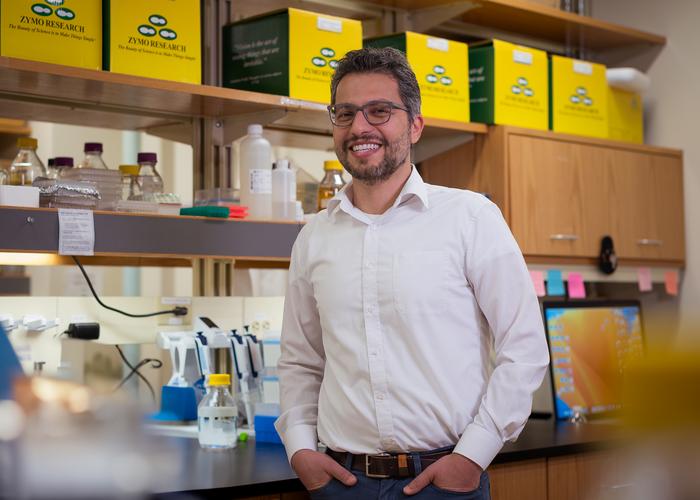Decades of research have left knowledge gaps about cells that regulate the immune system: Purdue and NIH

Credit: Purdue University photo/Jessica Kerkhoff
Decades of research have left knowledge gaps about cells that regulate the immune system: Purdue and NIH
Four decades of research have produced a vast pool of knowledge about regulatory T cells, a subset of our immune cells. Even so, scientists at Purdue University and the National Institutes of Health have identified 14 understudied T-reg proteins that merit increased attention for the molecular roles they play in disease onset.
“Our lab studies the exact molecular mechanism underlying autoimmunity, infection and cancer,” said Majid Kazemian, associate professor of biochemistry in the College of Agriculture and computer science in the College of Science at Purdue. An overactive immune system results in autoimmune diseases such as type 1 diabetes, multiple sclerosis and rheumatoid arthritis. And an underactive immune system means greater susceptibility to cancer. “This is the balance that exists in some cells. T-regs maintain those balances,” he said.
Kazemian joined with the National Institutes of Health (NIH)’s Jorge Trujillo-Ochoa and Behdad (Ben) Afzaliin reviewing the body of research about T-reg cells in the journal Nature Reviews Immunology. Kazemian and Afzali have contributed multiple publications to that body of work, including one on T-regs and autoimmune disease in 2018 and another on T-regs and cancer in 2021. Lead author Trujillo-Ochoa, an NIH postdoctoral fellow, specializes in regulatory T-cell biology and the proteins that control their function.
“Regulatory T cells are only a small percentage of the T cells that we have in our body, but you can’t live without them,” said Afzali, a Stadtman Investigator at NIH’s National Institute of Diabetes and Digestive and Kidney Diseases.
“Studying T cell processes at the molecular level is critical to understanding their implications on human diseases,” Afzali said. “If one of these processes goes wrong, you can get organ-specific disease. Understanding how these cells work also gives you the opportunity to intervene with molecules that can modify some of their functions.”
The review article focuses on transcription factors — proteins that regulate sets of genes, which program regulatory cells to perform certain actions.
“In theory, you may find some of these programs are abnormal in patients who develop diseases,” Afzali said. “Understanding these molecular mechanisms is important to make that connection in diseases.” For example, if a virus switches off one of those transcription factors, the result might be a defect in a cellular program that leads to a corresponding autoimmune disease.
T-reg cells have particular transcription factors that maintain the core function of dampening the activity of other immune cells.
“We could have additional transcription factors that amend specific functions,” Kazemian said. “To identify what factors drive some of the T-regs toward certain paths is going to help us prevent autoimmunity or to help cancer patients by fine-tuning particular T-regs. What happens to them that they acquire a specific property or functionality?”
Each line of specialized cells could have a different function in various organs and diseases. “For example, we have shown that a specific gene in the T-regs called TCF1 is associated with colorectal cancer disease severity,” Kazemian said.
Afzali, an M.D.-PhD, is especially interested in cell therapy that involves removing regulatory cells, altering them outside the body, then putting them back in.
“Regulatory T cells as a form of cell-based therapy is just one arm of this incredible field,” Afzali said. “It’s a blossoming area of research, and we’re learning more about what can and can’t be done.”
This work was supported by the NIH, the National Institute of Diabetes and Digestive and Kidney Diseases, and the Purdue Institute for Cancer Research.
Writer: Steve Koppes
Journal
Nature Reviews Immunology
DOI
10.1038/s41577-023-00893-7
Method of Research
Literature review
Subject of Research
Cells
Article Title
The role of transcription factors in shaping regulatory T cell identity
Article Publication Date
19-Jun-2023
COI Statement
The authors declare no competing interests.




